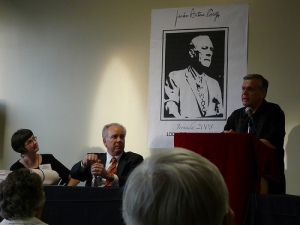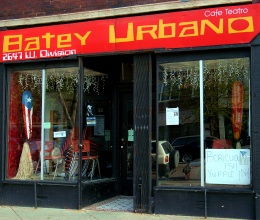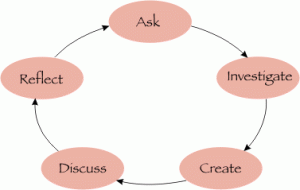Barbara Stengel’s “theory-practice puppy” is commanding attention this summer in Oklahoma too, precisely over Andrea English’s question—but in its non-satirical ordinary sense associated with necessary adult efforts at child-minding, as distinct from institutional surveillance. Andrea is right that the latter is a serious social issue worthy of much critical discussion, and I don’t want to detract from the importance of her concern about institutional surveillance. But I have little to add to it, and at the same time I know that this question’s non-satirical sense has a different kind of urgency for students who are parents. For their sake I do want to suggest that this question’s ordinary sense presents a social issue as well, about which “post-feminist” complacency on a Social Issues blog like this would be decidedly premature.
As professional educators, we have dedicated our lives to the improvement of children’s schooling and of colleges and universities. Yet how many of us have taken those broad aims seriously enough to pause and ask our students—not in the interest of surveillance, but in the interest of empathetic understanding of what they and their children are going through: Who’s watching their “kids” while they’re in class? How hard was it to find someone or someplace to help them fulfill that responsibility? How long did they have to spend on a waiting list in order to get such help? How much is such child-minding costing them, and how can they possibly afford it as graduate students? What are their children doing and learning while they’re in class? Where, when, and how can they find the time to get their own academic work done? What do they have to do when their daughters or sons or their parental partners or hired child-minders get sick? What effects might their parenthood have on their anticipated speed of degree completion? And, last but certainly not least in any educational studies program worth the name, what educational wisdom might they be learning through their abundant parental labors? (Such questions can be posed intrusively to individuals, of course, but I am not suggesting that; as discussion questions, they need not and should not be posed intrusively.) Doubtless some of you have felt little need to ask such questions because you have worked through such challenges yourselves and know how difficult they can get, but I have not confronted them myself, because (much to my regret) I have never been a mother. As a doctoral student, I conducted philosophical and literary case studies of mothering as educating, partly with a view toward my own future motherhood. But watching my female peers in such circumstances, I could never see my way past such hard questions to envision myself even capable of working through them adequately while a doctoral student, while an assistant or associate professor. Therefore, I confess a personal disposition to admire the
chutzpah and ingenuity of graduate-student mothers.
After witnessing my step-daughter’s childbearing and childrearing through nearly a decade of scientific doctoral work at a major research university, a mighty and sometimes desperate but ever resourceful struggle even with my son-in-law’s 100% collaboration and remarkable parental talents raising my grand-daughter, now aged six, I resolved to open Pandora’s Box by asking what our student-parents in educational studies are going through here in Oklahoma. Graduate students specializing in educational women’s and gender studies have gathered together over all the above loaded questions this summer around a table at our local free public library’s children’s section. Their children, of both sexes, range from the age of five months to the age of military deployment in Iraq, and some students are not yet parents, but hope someday to bear and raise children of their own without sacrificing their intellectual and professional development in order to do so. They are themselves diverse in age, race, national origin, marital status, sexual orientation, and economic circumstances, and (because they do need to feed and shelter their children) most are employed full-time as educators of various sorts while attending graduate school and raising their children.
In response to my questions, I got an earful that I cannot divulge without IRB approval for such communication; that is why I enjoin you to find a way to ask these same sorts questions of
your students, so that you can compare what you find out with what scholar-mothers are writing on
Inside Higher Ed’s
MAMA PhD blog by, about, and for “Mothers attempting to balance parenthood and academics." Lest you wonder at the practical or theoretical significance of such informal and internet inquiries with your students, one graduate student-mother of two, Robin Stroud, has referred me to an interesting University of Victoria dissertation (1997--old but probably not yet outdated) in Communication and Social Foundations,
Breaking the Silence: Toward a Theory of Women’s Doctoral Persistence, by Roberta-Ann Kerlin, a qualitative study of electronic mail transcripts and face-to-face interviews, whose fifth chapter reports of her research subjects that “To be seen and accepted as serious scholars in the academic milieu, where motherhood has a negative status, required them to make a cognitive shift in which one’s primary identity as a woman was displaced with a newly emerging identity as a scholar. This identity shift gave rise to internal conflict and was manifested in the strained and sometimes estranged relations the women experienced with their families. . . . This reshaping of their identities in a way that devalued this fundamental aspect of who they were contributed significantly to the ambivalence the women felt toward academe as an institution.” Yes, I know! There
is essentialism here, but so what? The alienating conflicts reported are deeply felt nonetheless, with consequences for women’s doctoral persistence.
Even without IRB approval, I think I can safely tell you that graduate-student mothers in the University of Oklahoma’s College of Education are no strangers to Barb’s theory-practice puppy. At the
Society for Educating Women’s
inaugural conference in the
Jane Addams Hull-House Museum in May 2008, one student leader within the Oklahoma group, Kara Morgan, a toddler's mother, had presented a carefully conceptualized survey of theoretical literature on mothers’ learning; a new mother, Maria Laubach, had presented her study of Johann Heinrich Pestalozzi’s theory of pedagogical mothering in German; and yet another mother of three, Julie Davis, had presented her study of Black lesbian-feminist Audre Lorde’s theorizing about maternal teaching, specifically with regard to her thought on educative vs. miseducative anger. A couple of them had read Jane Roland Martin’s
Coming of Age in Academe (2000) and recognized this informal summer gathering at the public library as what Martin, following the Swedes, had named a “fika,” a gathering for both mutual support and problem-solving. Meanwhile one schoolteacher-mother of two teenagers, Kristen Holzer, had presented her formulation of lesbian-feminist mother-poet Adrienne Rich’s thought on coeducation, and therefore urged the group to study together Rich’s classic 1975 essay in
On Lies, Secrets, and Silence (1979)—“Toward a Woman-Centered University”—because it lays out an agenda for what this group calls “family-friendly” campus development.
Now in legal process of non-profit incorporation as the
Oklahoma Mothers and Educators Collaborative (with guidance from a graduate student who presented her feminist-ethical critique of legal education at the Hull-House conference, Virginia Henson), this group has articulated its mission, begun designing a website, embarked upon research on other universities’ family-friendly features (which have turned out mostly to target faculty, not students) and upon possible partnerships with various Student Life administrators including one non-mother student in the group, Johnnie-Margaret McConnell, and the university’s Women’s Outreach Center. They are planning what they hope will be a schedule of children’s meals, homework help, and artistic, aesthetic, and athletic activities during their evening class times, over which student interns and retired persons may preside; this means they are wrestling with hard questions about safety, insurance, and the like in order to realize their vision of what they want for their children. But they believe that an educational studies program’s student parents can make the college of education a vital locus of cultural creativity, initiative, and leadership for educational programming that can benefit graduate students’ children across the university as well as women’s persistence to graduate-degree completion and education students’ professional learning. Realistically and collaboratively, they are starting small, doing only what they can, one step at a time.
How do busy student-parents find time for such activity? They find time for it because it offers them a supportive community of friends who are going through similar parental and academic struggles as well as opportunities to transform practical obstacles to their graduate studies into subject matter for their scholarly study. This activity is part of their apprenticeship for the educational studies professoriate, through which they are learning how to theorize, initiate, organize, and lead transformative professional service for social justice—for policy changes and new programs of educational value. Indeed one member of the group, Pam Harjo, a mother whose graduate assistantship concerns service to a department committee for graduate recruitment, is showing the group how their work may serve that interest no less than their own needs as student-parents. Meanwhile, the problems to which this group’s members are giving their attention pose many questions worthy of philosophical, historical, and sociological research on childrearing, higher education, and women’s & gender studies. Moreover, they could learn much from those of you who have learned how to survive the juggling act that they are now attempting—and from your students who are also parents. Contact: mothers.educators@gmail.com.
 The fifth annual Community as Intellectual Space Symposium will be held on June 12-14 at La Estancia on 2753 W. Division Street, Paseo Boricua, Chicago, Illinois.
The fifth annual Community as Intellectual Space Symposium will be held on June 12-14 at La Estancia on 2753 W. Division Street, Paseo Boricua, Chicago, Illinois. The keynote speaker this year is Antonia Darder, a Professor at the University of Illinois in Educational Policy Studies and Latino/a Studies. There will be presentations and workshops on
The keynote speaker this year is Antonia Darder, a Professor at the University of Illinois in Educational Policy Studies and Latino/a Studies. There will be presentations and workshops on

